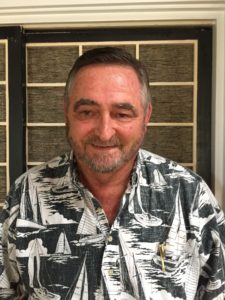
In this episode, we have an interview (above) with Paul Bienfang. He tells us about his experience as a patient in the Ekahi Dr. Ornish’s Program for Reversing Heart Disease™, at 500 Ala Moana Boulevard in Honolulu. Paul entered the program because he had diabetes, hypertension, high cholesterol, and renal insufficiency. His doctor had told him that he might need dialysis one day, and he was trying to prevent this from happening.
Paul also lost 14 pounds on the program and improved his diabetes. Paul’s creatinine (a measure of renal function) at the beginning of the program was 1.7, which is elevated. At the end of the program, he had a normal creatinine of 1.1. It is well-known that a plant-based diet can prevent worsening of renal disease, but it is less well-known that a plant-based diet can actually reverse damage done to the kidney…
The kidneys filter and eliminate most of the nutrients that we do not use. Excess protein is a burden to the kidney. The Standard American Diet (SAD diet), with its emphasis on animal products, is loaded with protein. Excess protein from the typical SAD diet overworks the kidneys. Studies using a low-protein diet for people with kidney disease have found the kidney function declines less rapidly than for those on a higher protein diet. Proteins from plants have also been shown to slow the progression of kidney disease more effectively than animal proteins.(1) The body is better able to handle plant protein better than animal protein.(2)
In addition, the two leading causes of renal failure in the United States are hypertension and diabetes. A plant-based diet treats both hypertension and diabetes effectively, and therefore usually improves kidney disease. Also, the most common correctable cause of glomerulonephritis, another cause of kidney failure, is an allergic-type of reaction to animal proteins. People with glomerulonephritis have been cured by changing to a diet of less inflammatory vegetable foods.(1)
From the website for DaVita, which is a well-known provider of dialysis for patient with renal failure:
“Vegetarian diets may help slow down the progression of renal disease without compromising nutritional needs. High protein consumption has long been shown to potentially have harmful effects on the kidney in those with pre-existing kidney disease.
Iron, calcium, zinc, vitamin D and B12 should not be a concern for vegetarians on dialysis. The renal vitamin that is prescribed for hemodialysis patients should contain vitamin B12 and zinc. All dialysis patients are regularly evaluated and prescribed calcium, vitamin D and intravenous (IV) iron by their doctors if and when they need it.”(3)
They list several benefits of a vegetarian diet including decreased protein in the urine, slowing the decline of kidney blood flow, less kidney tissue damage when compared to animal proteins, reduced kidney cyst growth, and decreased fat in the blood.(3)
(1) McDougall, John. “Diet and Kidney Health.” McDougall Newsletter. drmcdougall.com. July 2007. Web. Accessed 14 January 2016. <https://www.drmcdougall.com/misc/2007nl/jul/kidney.htm>
(2) Greger, Michael. “Treating Kidney Failure through Diet.” Youtube. Nutrition facts.org. 16 July 2012. Web. Accessed 14 January 2016. <http://nutritionfacts.org/video/treating-kidney-failure-through-diet/>.
(3) Patel, Chhaya. “The Vegetarian Diet and Chronic Kidney Disease.” DaVita. DaVita Healthcare Partners Inc. Web. Accessed 14 January 2016. <http://www.davita.com/kidney-disease/diet-and-nutrition/lifestyle/the-vegetarian-diet-and-chronic-kidney-disease/e/5346>


